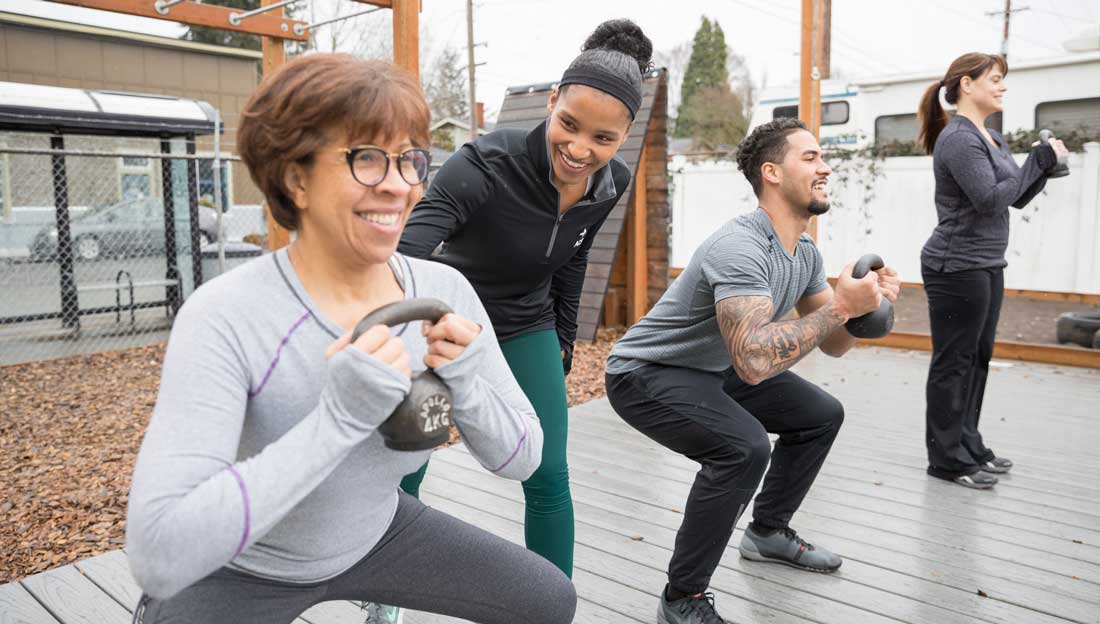
Does Group Fitness Offer More Health Benefits Than Exercising Alone?

As a health and fitness professional, you know that every bit of exercise, regardless of the intensity or time spent doing it, can help contribute to your clients’ overall health and well-being—and that any exercise is usually better than no exercise at all. Of course, that doesn’t mean that some forms of exercise aren't more effective than others, especially when it comes to meeting specific health and fitness goals. However, when it comes to improving overall quality of life—especially modern life, with all its pressures and over-packed schedules—a new study suggests that exercising in a group may be a particularly effective way to reduce stress and improve not only one’s physical health, but mental and emotional well-being as well.
The study, recently published in The Journal of the American Osteopathic Association, revealed that working out in a group lowered stress by 26% and significantly improved quality of life, while those who exercised individually put in more effort but experienced no significant changes in their stress level and a limited improvement to quality of life.
“The communal benefits of coming together with friends and colleagues, and doing something difficult, while encouraging one another, pays dividends beyond exercising alone,” said Dayna Yorks, D.O., lead researcher on this study. “The findings support the concept of a mental, physical and emotional approach to health.”
Dr. Yorks and her fellow researchers at the University of New England College of Osteopathic Medicine recruited 69 medical students—a group known for high levels of stress and self-reported low quality of life—and allowed them to self-select into a 12-week exercise program, either within a group setting or as individuals. A control group abstained from exercise other than walking or biking as a means of transportation.
Every four weeks, participants completed a survey asking them to rate their levels of perceived stress and quality of life in three categories: mental, physical and emotional.
Those participating in group exercise spent 30 minutes at least once a week in a core strengthening and functional fitness training program called CXWORX. At the end of the 12 weeks, their mean monthly survey scores showed significant improvements in all three quality of life measures: mental (12.6%), physical (24.8%) and emotional (26%). They also reported a 26.2% reduction in perceived stress levels.
By comparison, individual fitness participants were allowed to maintain any exercise regimen they preferred, which could include activities like running and weight lifting, but they had to work out alone or with no more than two partners. On average, the solitary exercisers worked out twice as long, and saw no significant changes in any measure, except in mental quality of life (11% increase). Similarly, the control group saw no significant changes in quality of life or perceived stress.
What This Study Means to Health and Fitness Pros
The best and most effective exercise is the kind that people actually want to do. So, if your client is in peak flow while running solo on the trails, exercising in a group setting may not be a panacea for any stress he or she might be experiencing. However, for those clients who are open to it, adding a group fitness class to their weekly exercise schedule may be an effective way to boost mood and reduce stress—all while getting in a good workout. Additionally, if you know your client is going through a particularly tough time or is under a lot of stress, suggesting that he or she join a group fitness class or a small-group training session could be just what your client needs to help alleviate that stress.
Finally, it is worth noting that this study involved medical students, who are arguably in one of the highest-stress phases of their lives. Given this data on the positive impact group fitness can have, the researchers believe schools should consider offering group fitness opportunities to students as an outlet to help them manage stress and feel better mentally and physically, which could potentially “alleviate some of the burnout and anxiety in the profession,” says Dr. Yorks. What works for medical students would undoubtedly work for other professions, as well, which means these findings offer strong evidence in support of workplace wellness opportunities that feature group fitness classes as a means of lowering stress among employees.

More Articles
- Certified™: December 2017
ACE-SPONSORED RESEARCH: What Is the Optimal FIT to Reduce Sedentary Behavior to Improve Cardiometabolic Health?
- Certified™: December 2017
Can Subcontracted Trainers Help You Grow Your Business?
Health and Fitness Expert
- Certified™: December 2017
14-minute Metabolic Workouts
Health and Fitness Expert




 by
by 

